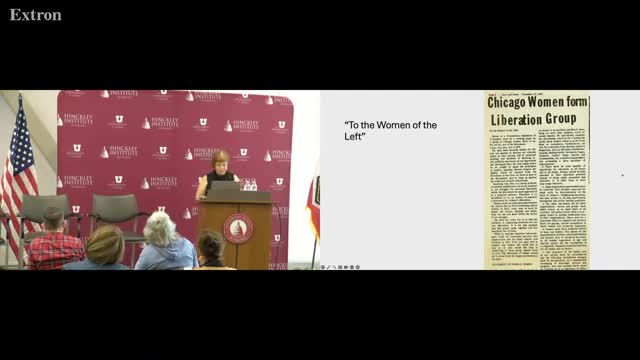Radical Women's Movement Emerges from Chicago Union
October 18, 2024 | Hinckley Institute of Politics, Citizen Journalism , 2024 -2025 Utah Citizen Journalism, Elections, Utah
This article was created by AI summarizing key points discussed. AI makes mistakes, so for full details and context, please refer to the video of the full meeting. Please report any errors so we can fix them. Report an error »

In a recent government meeting, discussions centered on the evolving landscape of women's rights and the intersection of feminism with broader social justice movements. Participants highlighted the need for proportional representation of women in political, economic, and social institutions, advocating for their full participation in decision-making processes. This call aligns with the principles of participatory democracy but stops short of demanding a complete overhaul of existing governmental structures.
The meeting also addressed the media's role in perpetuating stereotypes of women, emphasizing the importance of equal opportunities in education and the workplace, including equal pay for equal work. Participants underscored the necessity of restructuring family dynamics, advocating for communal child care and shared domestic responsibilities to alleviate the burden traditionally placed on women.
A significant point of contention emerged regarding the direction of the women's liberation movement, with some members advocating for a more radical approach. This divergence was exemplified by the formation of the Chicago Women's Liberation Union, which sought to create a multi-issue women's movement that connected women's liberation to other revolutionary struggles against capitalism, racism, and imperialism.
The Chicago Union's political theory emphasized the importance of multi-pronged activism, combining immediate needs with long-term strategies. They argued for grassroots organizing and the development of leadership within the movement, rejecting the notion of leaderlessness in favor of accountable leadership structures. The union's approach recognized the complexity of oppression, advocating for coalitions across racial and social lines while remaining focused on the immediate needs of women.
As the meeting concluded, participants reflected on the historical context of these discussions, questioning why certain feminist narratives have been prioritized over others. The emphasis was placed on rediscovering the contributions of socialist feminism and the Chicago Union, suggesting that a more inclusive understanding of feminist history could inform contemporary movements for social change.
The meeting also addressed the media's role in perpetuating stereotypes of women, emphasizing the importance of equal opportunities in education and the workplace, including equal pay for equal work. Participants underscored the necessity of restructuring family dynamics, advocating for communal child care and shared domestic responsibilities to alleviate the burden traditionally placed on women.
A significant point of contention emerged regarding the direction of the women's liberation movement, with some members advocating for a more radical approach. This divergence was exemplified by the formation of the Chicago Women's Liberation Union, which sought to create a multi-issue women's movement that connected women's liberation to other revolutionary struggles against capitalism, racism, and imperialism.
The Chicago Union's political theory emphasized the importance of multi-pronged activism, combining immediate needs with long-term strategies. They argued for grassroots organizing and the development of leadership within the movement, rejecting the notion of leaderlessness in favor of accountable leadership structures. The union's approach recognized the complexity of oppression, advocating for coalitions across racial and social lines while remaining focused on the immediate needs of women.
As the meeting concluded, participants reflected on the historical context of these discussions, questioning why certain feminist narratives have been prioritized over others. The emphasis was placed on rediscovering the contributions of socialist feminism and the Chicago Union, suggesting that a more inclusive understanding of feminist history could inform contemporary movements for social change.
View full meeting
This article is based on a recent meeting—watch the full video and explore the complete transcript for deeper insights into the discussion.
View full meeting

